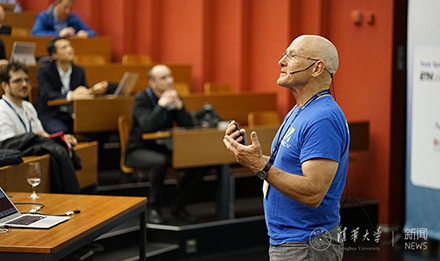New RIOS Lab to expand open-source ecosystem for dominant computer processor instruction set
The Tsinghua-UC Berkeley Shenzhen Institute (TBSI) has launched a non-profit research lab to expand and elevate the capabilities of reduced instruction set computer (RISC) microprocessors. Researchers will be developing open-source hardware and software designs at the RISC-V International Open Source Laboratory, or RIOS. The lab’s name is also inspired by the Spanish word for “rivers.”

David Patterson announces the RIOS Laboratory at the RISC-V Workshop in Zurich, Switzerland. (Credit: Tsinghua University)
“We chose that name because it symbolizes the flow of information from many sources, coming together to create a whole that is greater than the sum of its parts,” said RIOS lab director Dave Patterson, a UC Berkeley professor emeritus of electrical engineering and computer science.
Patterson shares a prestigious Turing Award for his work on RISC, an influential approach to computer architecture that allowed microprocessors to operate far more efficiently with simple, general instructions. Of the 16 billion microprocessors produced annually, nearly all are RISC processors.
The RIOS lab will be based at TBSI, a joint research and educational partnership established by UC Berkeley, Tsinghua University and the Shenzhen municipal government to promote research collaboration and graduate student education. The majority of engineers would come from TBSI, but the lab is expected to host international researchers, as well.
Patterson announced the new lab at a recent RISC-V summit in Zurich, Switzerland. Zhangxi Tan (Ph.D. ’13 EECS) and Lin Zhang, a professor of electronic engineering at TBSI, will be co-directors of the RIOS Laboratory.
